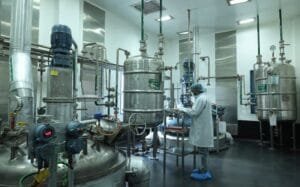Chandigarh, October 10: Punjab, long celebrated as India’s breadbasket, is now taking a major stride toward becoming the country’s pharmaceutical powerhouse. IOL Chemicals and Pharmaceuticals Limited (IOLCP) has announced a ₹1,133-crore expansion of its Barnala facility — a move the Bhagwant Mann-led government hails as a landmark in its “Rangla Punjab” industrial growth vision.
The expansion, which totals ₹1,220.83 crore in investment, will significantly scale up IOLCP’s production of Active Pharmaceutical Ingredients (APIs) and chemicals at its Fatehgarh Channa unit along Mansa Road in Barnala district. The upgraded facility will produce 860 tonnes per day of chemicals and APIs, along with a 33 MW co-generation power plant and 2,250 lakh units per day of formulation products.

Chief Minister Bhagwant Mann said the project showcases Punjab’s transformation into a hub for advanced industries. “This is not just an industrial investment; it is an investment in Punjab’s future — in our youth, our health, and our self-reliance,” he said, adding that the state’s “honest and transparent policies” have created a pro-investment environment free from bureaucratic hurdles.

IOLCP, one of the world’s largest manufacturers of Ibuprofen, said the expansion aligns with India’s broader goal of achieving pharmaceutical self-reliance. The company’s new facility, spread across multiple Khasra numbers on the Bathinda–Chandigarh Highway in Badbar village, aims to boost domestic production of key drug ingredients that were previously imported.
The project also underscores the state’s commitment to sustainable development. Around ₹13.9 crore has been allocated for environmental safeguards, while the plant’s co-generation power capacity will rise from 17 MW to 29.75 MW. “We are building not only factories but a cleaner, greener Punjab,” Mann said.
Officials said the project will generate thousands of direct and indirect jobs, opening up employment opportunities for local youth. “When such large projects take shape, employment follows naturally,” a senior state industry department official noted.
Under Mann’s leadership, Punjab has sought to shed its image as an agrarian-only economy by aggressively promoting manufacturing, pharmaceuticals, and clean industries. Over the past year, the government has rolled out investor-friendly policies and expedited project clearances, which, it says, have helped attract big-ticket investments across sectors.
The IOL Chemicals expansion, Mann added, is a “testament to what honest governance and decisive action can achieve.” He said it strengthens both Punjab’s economy and the central government’s Atmanirbhar Bharat mission by reducing dependence on imported drug ingredients.
Industry observers say the project positions Punjab as a major pharmaceutical hub in northern India, marking a key shift in the state’s industrial landscape. “This is more than an expansion — it’s a statement of intent,” an analyst said.
As the IOLCP Barnala plant gears up for construction, the Mann government says it sees the project as symbolic of a new era in Punjab — one where industry, employment, and environmental responsibility grow side by side.
“This is not just the story of a company,” Mann said. “It’s the story of Punjab rising again — from the fields to the factories, from food security to health security.”


